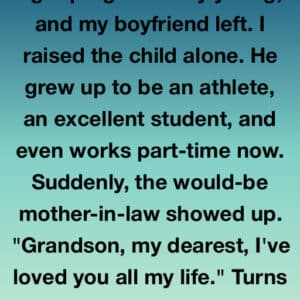The Day My Trust Was Tested: A Modern Parent’s Quiet Panic
I have always worn my title of “Modern, Trusting Parent” with quiet pride. In a world where parents track their teenagers like GPS beacons, where message threads are scrutinized and privacy becomes a rare luxury, I chose a different lane. I wanted to raise a daughter who felt trusted, not monitored… respected, not cornered.
And for the most part, we lived by that philosophy. She knew my boundaries. I knew her heart.
But trust theory is easy.
Trust practice happens in the dark, behind a closed bedroom door, on a rainy Sunday afternoon when a boy is inside.
The Closed Door
My daughter is fourteen — that delicate threshold between childhood and adulthood where innocence and impulse live side-by-side. Her boyfriend is also fourteen, a sweet, respectful boy who seems to have been handcrafted in a politeness factory.
He remembers to take off his shoes.
He says “Thank you” without being prompted.
He speaks softly and looks adults in the eye.
He’s the kind of kid every parent claims they want.
Except when he’s in your daughter’s room. Then biology speaks louder than manners.
They’d been in there almost an hour. No noise, no movement. Just silence — the kind that makes a mother’s imagination stage a Broadway production of worst-case scenarios.
And so, eventually, I walked down the hall and stood in front of the door, listening.
Nothing.
I knocked gently.
Still nothing.
I opened the door… just a sliver.
What I Actually Found
The sight that greeted me was so ordinary, so wonderfully boring, that I almost laughed from sheer relief.
They were sitting cross-legged on the floor, surrounded by open math books, erasers, pencils, and crumpled scratch paper. My daughter was explaining an equation, her hand slicing through the air like a tiny professor. He was nodding earnestly, brow furrowed in concentration.
It was just two kids — studying.
Not flirting.
Not experimenting.
Not proving my fears right.
Just studying.
The untouched plate of cookies on her desk felt like evidence of innocence, glowing like a halo.
My daughter glanced up. Confused. Curious.
“Mom? Everything okay?”
Her voice carried no guilt. No irritation. Just a hint of that teenage amusement, the kind that says: Why are you acting weird, Mom?
“I—just checking if you two need anything,” I managed.
She smiled. A soft, knowing smile that said, without words, You can breathe.
I closed the door, feeling a warmth — and a sting.
The Internal Earthquake
On the walk back to the kitchen, I realized something uncomfortable:
I trust my daughter.
But I don’t always trust the world around her.
And that’s the real struggle of raising teenagers today.
Not “Are they good?”
But “Is the world ready for their decisions?”
As adults, we carry memories and mistakes. They carry curiosity and new hormones. And sometimes, our past tries to write their future.
Later That Night
When I passed her room again, I heard laughter — light, unfiltered teenage laughter. The kind that belongs to children who haven’t yet learned to hide joy behind walls of insecurity.
And in that moment, I felt something soften.
I realized trust isn’t a grand declaration.
It’s a muscle.
A trembling, imperfect muscle you keep choosing to use.
It doesn’t mean letting go completely.
It doesn’t mean pretending dangers don’t exist.
It means balancing presence with respect.
Awareness with restraint.
Love with boundaries.
The Conversation
Later that evening, as she washed dishes beside me, she said casually:
“You can check on us, you know. I don’t want you to feel weird about it.”
She said it so simply — not defensive, not irritated — but with a maturity that humbled me.
“I just want you safe,” I replied.
She nodded, rinsing a plate.
“I know. And I won’t put you in a position where you can’t trust me.”
For a moment I just stood there, watching this child-woman who was slowly becoming her own person.
And I realized something:
She doesn’t need a warden.
She needs a lighthouse.
Someone steady.
Someone warm.
Someone who lights the path—
without forcing her steps.
The TruthLens Lesson (woven softly)
Real trust isn’t silence.
It’s presence without intrusion.
Real guidance isn’t fear.
It’s wisdom offered gently.
Real protection isn’t locking every door.
It’s teaching them how to navigate their inner storms with dignity, clarity, and self-respect.
Because one day, that boy won’t be in her room.
But adulthood will be at her door.
And the only thing that will keep her safe then…
is the character she built under my watch.
The Ending
So yes—
I peeked behind the door.
Not because I doubted her heart.
But because motherhood is equal parts faith and caution.
And what I found wasn’t danger.
It was a reminder:
Our children grow best in the space between love and freedom —
where trust becomes a bridge, not a leash.





